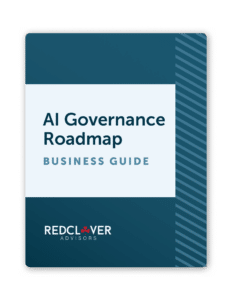Remember 2002, when flip phones were all the rage and Artificial Intelligence was just the latest Stephen Spielberg movie?
Those were good times.
Fun fact: 2002 was also the year that Cathy Doss became the world’s first Chief Data Officer (CDO) at Capital One.
But let’s fast-forward to 2024. It’s not a stretch to say that today’s CDOs (you might be wondering “Chief Data” or “Chief Digital Officer”—they both wear the CDO hat, after all—but we’re focusing on the “data” side of things here) have a lot more on their plate. And a lot of that is thanks to AI.
Already, 72% of U.S. businesses use AI for one or more business functions. For small businesses, this number is even higher: 98% of small businesses report using tools enabled by AI.
CDOs are in a unique position regarding AI. They have the power to safeguard companies and their customers from AI risks and ethical pitfalls while promoting AI use cases that will add real value to a business’s operations.
But the AI landscape is full of pitfalls and landmines. So, how can CDOs rethink data privacy and governance to implement ethical, effective AI use cases?
The AI-driven data landscape: ethical and regulatory challenges
CDOs have a lot to deal with when it comes to AI.
AI governance has to be aligned with the evolving regulatory landscape.
So far, Utah and Colorado have incorporated AI laws in their existing consumer protection statutes (and, of course, the EU has their AI Act), and others will likely follow. But beyond AI-specific laws, many existing data privacy regulations, such as the California CCPA, incorporate AI or address automated decision-making specifically.
AI is not a perfect system.
There are still serious ethical concerns related to the use of AI, like biased or unfair decision-making.
There is a lot of consumer skepticism regarding the use of AI.
Eighty-one percent of consumers believe that companies will use their information in ways that make them uncomfortable.
Consumer trust isn’t just critical to the integrity of your data (after all, if consumers don’t trust you, they’re unlikely to provide accurate personal data). It’s also critical to your bottom line.
Consumer trust is an essential predictor of company performance and profit.
So what’s the solution?
CDOs, who have always had an evolving role, must rethink data privacy and governance once again to integrate AI.
The evolving role of CDOs
Data is the lifeblood of decision-making, and CDOs have the critical job of maintaining, protecting, governing, and using that data to support a company’s strategic goals.
With the widespread adoption of AI, CDOs must know how to leverage data with AI and how to protect the company and its consumers from unethical or risky AI practices while still encouraging innovation and forward-thinking in their employees.
But what does this look like in real life?
Practical steps to integrate your AI program with data ethics and privacy frameworks
Every business will have a different approach to AI based on its specific needs and use cases. However, there are practical steps that every business can utilize when it comes to AI governance.
Build a cross-functional data governance program
Bring together stakeholders from across your organization to create a successful AI governance program. During the process, identify privacy champions to act as resources for employees in different business functions, and to obtain real, honest feedback about your program.
Create AI assessment templates to evaluate current and future AI use cases
A standardized assessment tool creates a clear path forward to understand what AI processes are truly beneficial to your business, how AI models will be used, and how they collect, use, access, share, or store data.
Establish AI guardrails
Limit AI autonomy in decision-making processes, especially in high-risk or high-risk adjacent applications. Ensure human oversight for all AI-driven decisions.
Conduct role-based AI training
Make sure employees understand the practical and ethical concerns in AI systems and how they can ask questions and propose new AI use cases.
While every employee needs AI training, some have more access to sensitive data or may use AI in higher-risk scenarios. Providing role-based AI training for employees, especially those involved in data collection, analysis, and AI program development, is essential.
AI Governance Roadmap: Business Guide
Our AI Governance Roadmap guides you to success in developing an AI governance program.

Strategies to protect data privacy in your AI governance program
Even if you already have a robust data privacy program in place, it’s important to review it against your AI use cases to ensure your system is functioning as intended.
Make sure your data use aligns with your privacy documents
Businesses should only collect user data for pre-established needs per data privacy regulations. Once you have user data, you can’t keep it for eternity and use it however you want (or share it with every new AI program on the block).
Any time you plan to use consumer data for a new AI model, update your privacy notice to make sure it reflects your business practices.
The reality is that data that goes in doesn’t always come out the same way—so how do you handle it? More specifically, how do you uphold privacy rights?
There’s no one solution, so it’s important to work with your privacy team to stay clear about your AI use and set up processes and systems for handling requests like access or erasure.
Apply data anonymization and masking
Before feeding any personal data to AI systems, anonymize or pseudonymize the data to protect identifiable user information while maintaining its utility for analysis.
Companies working with large data sets should integrate differential privacy techniques
Differential privacy allows users to see if individual privacy is guaranteed within a data set.
If your company is training models on sensitive information, consider implementing differential privacy techniques to add statistical noise to your data sets. This process safeguards an individual’s privacy while still preserving data utility.
Consider federated learning techniques for training your AI models
First introduced by Google in 2017, federated learning is a way to train machine learning models without requiring the collection and storage of data in one central location. One of the benefits of federated learning is that it encourages data minimization by design. It allows models to learn while preserving user privacy.
To learn more, see how Google researchers integrate data privacy and federated learning to achieve differential privacy.
Building trust through ethical practices
The future of AI is ethical AI.
Ethical business practices, whether providing transparent consumer notices or protecting technical data sets, are critical to fostering consumer trust, which in turn impacts a company’s bottom line. After all, consumer trust is one of the biggest factors in a business’s profit margin.
A proactive approach to privacy compliance is key for CDOs looking to navigate the new data ethics landscape and give their company a competitive edge.
Thankfully, there are plenty of resources to stay informed about evolving privacy regulations and AI ethics in your industry, whether through podcasts, newsletters, or LinkedIn.
Need a hand?
An outside expert can help you build an AI governance policy that meets your business’s needs. Reach out to our team at Red Clover Advisors to book your free consultation.


